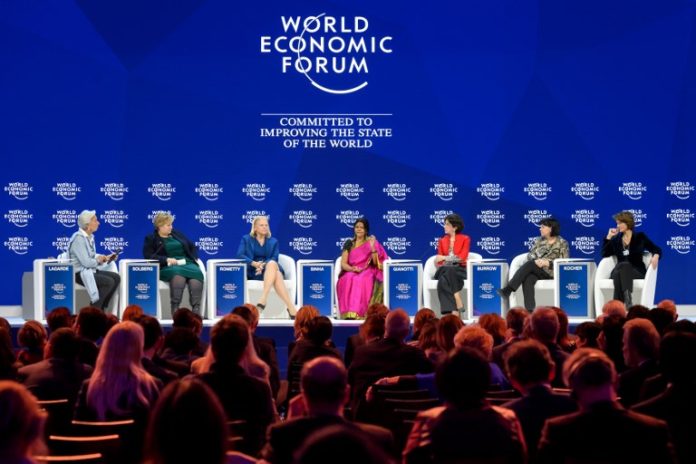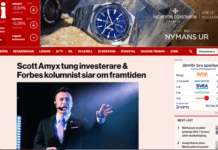
This week the World Economic Forum (WEF) made history with its all female co-chairs for the annual meeting held in Davos — International Monetary Fund Managing Director Christine Lagarde, Prime Minister of Norway Erna Solberg, IBM Chairperson and CEO Ginni Rometty, Founder and Chair of Mann Deshi Foundation Chetna Sinha, European Organization for Nuclear Research Director-General Fabiola Gianotti, International Trade Union Confederation General Secretary Sharan Burrow and ENGIE CEO Isabelle Kocher.
Here are some facts about World Economic Forum. It’s no secret that WEF brings together the world most elite 3,000 corporate tycoons, politicians, monarchs and intellectuals representing 100 countries. And World Economic Forum has been harshly criticized in the past for its gender imbalance. Women attendees to WEF’s annual meeting mostly hovered 17% until last year when it rose to almost 30%. At some point, it was so bad that they’ve even had to institute a quota in 2011 mandating big companies to send at least one woman for every four men. Back in 2013, there was only one woman among the six co-chairs. In 2016, it was evenly split. In 2017, for the first time, the female co-chairs took majority. So it’s quite amazing that the pendulum has swung entirely to all women co-chairs at this week’s World Economic Forum in Davos.
Though some of this has been in the works through the World Economic Forum’s Global Council on Diversity and Talent and Employment & Gender Initiatives under the guidance of the WEF Executive Committee, the #MeToo movement was the tipping point. And it wasn’t isolated to the US. #Balancetonporc in France. #YoTambien in Spain. #MeToo was even translated in Arabic in the Middle East and Africa. By November last year, #MeToo was tweeted 2.3 million times in 85 countries. This isn’t surprising given the fact according to a 2013 UN Women report, 99% of women surveyed across seven regions in Egypt had experienced some form of sexual harassment. In India, Bani Rachel Bali, an advocate for gender issues said she “felt the presence of sisterhood” in the movement.
“It’s only when we choose to do something incredibly uncomfortable that we can achieve outsized results on an international basis,” says Scott Amyx, author of Strive: How Doing the Things Most Uncomfortable Leads to Success. In Ashley Judd’s words, she was “willing to risk it all”. “I have to know the hill on which I’m willing to die and that hill is equality, and if that means going to jail, being maligned, being defamed, having tremendous economic loss because I stood up to Harvey Weinstein… that the hill on which I’m willing to die.” Oprah had a beautiful comment in InStyle interview about the #MeToo movement: “It has seared into the consciousness a level of awareness that was not there before. That’s the most important thing to me. When Reese Witherspoon can tell her story at the same time as a farm worker in Iowa or a factory worker in Alabama, it says to a person, “Oh well, I’ve been putting up with that asshole supervisor for all these years. Maybe it’s time for me to do something too.” You can see you’re not alone. We don’t have to turn our heads to pretend something isn’t happening in order to keep going. And now we have amongst ourselves actresses, producers, directors, and people in business discussing how we can create a reporting system so that everybody feels supported.”
The sad thing is that we’re still very far away from equality. According to World Economic Forum’s 2017 report on gender gap, the researchers estimate that it could take 217 years to close the gender inequality around the world, which was a revision up from the previous year’s estimate of 170 years to achieve gender equality. So we’re looking at sometime in 2234 when we can reach economic parity between women and men.
“But this inequality starts as early as K-12. Google, Microsoft and tech giants, even with strengthened diversity and inclusion programs, indicate that they don’t have enough pool of qualified women engineers and scientists. How are we as a society and as parents encouraging young girls and women to pursue technical and scientific fields, especially given the fact that we are facing a future where AI, robotics and automation could wipe out some 50% of jobs in the next several decades? There will, of course, be new job creation, but those jobs will require highly specialized and often PhD level skills to perform the jobs of tomorrow,” says Amyx.
Amyx shares, “In my graduate program, a female colleague filed a formal complaint of a sexual harassment against another student. Although she was the victim, she ended being expelled from the school while the assailant moved on without a blemish to his record. On the court date, I was the only male friend to show up. All others, including female students, were afraid to be associated in any way with the case as they feared retribution. That incident of injustice is seared into my permanent memory. Even after two decades, it still grieves me that the system failed her.”
The #MeToo movement is foundational to Strive. American Independence, Civil War, Arab Spring and now the #MeToo movement could not have changed the history of our civilization unless the first few took incredible personal risk, putting everything on the line, to take a stand.
Download PDFFor media inquiries, please contact:
Cinda Lam
Program Manager/
Director of Communications
press@scottamyx.com

















